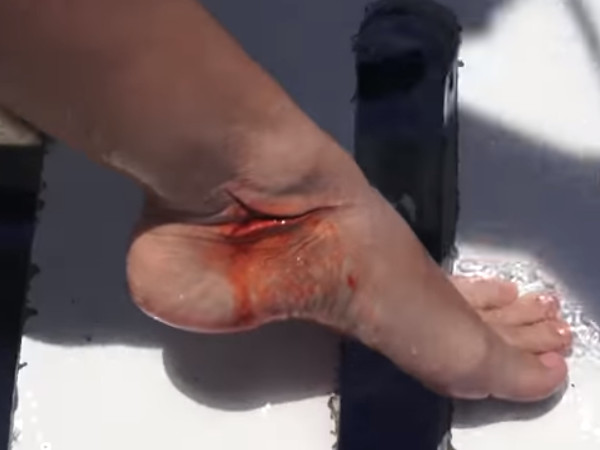All Publicity is Good Publicity … Until It Backfires
 MIAMI – When a publicity stunt succeeds, it’s a good thing. This can be true even if the stunt involves some manner of deception that eventually comes to light.
MIAMI – When a publicity stunt succeeds, it’s a good thing. This can be true even if the stunt involves some manner of deception that eventually comes to light.
Every so often, though, the stunt works a little too well, leading to backlash and recriminations those behind the stunt may not have anticipated.
I think this is what we’re seeing now with the increasingly infamous Molly Cavalli shark-dive stunt, which is starting to generate as much criticism as it its strategically-edited video has views.
By the time Bryce Rohrer, the owner of the Jupiter, Florida-based company Florida Shark Diving came forward to reveal he’d been contacted by Cavalli about the possibility of faking a shark bite incident, those who have seen more than a few real shark bites in their time already were convinced Cavalli’s wound was not a bite.
“I can tell you for a fact, it was not a shark bite,” said George Burgess, director of the Florida Program for Shark Research and part of the team that maintains the International Shark Attack File database. “How it was inflicted is conjectural, but the main thing is, the injury is not a shark bite. It was a PR stunt, and it worked.”
Based on an image presented within one of the messages Cavalli allegedly sent Rohrer, the wound may not have been an injury at all, but a bit of makeup wizardry cooked up well in advance of the dive.
“Just wanted to show you what the bite would look like,” Cavalli allegedly wrote in the message accompanying the image. “It’s more of a little knick [sic]. We were doing this as I was speaking to you today. I know you are shark lovers and don’t want it to be a negative thing.”
As Cavalli seemed to anticipate, Rohrer declined to be involved precisely because he wanted nothing to do with a publicity stunt that would reflect poorly on the creatures he loves.
“We immediately declined,” Rohrer said. “We are pro-shark, pro-wildlife, and want to show the importance of sharks, not villainize them.”
Of course, even if Rohrer were not a shark fan, there’s another problem with a company like his taking part in a stunt of this sort.
“It’s so bad for business, so bad for the image of sharks in general and makes shark diving look really bad,” Rohrer added.
Indeed, who would want to go shark diving with a company made famous by one of its clients being bitten on the foot while inside one of the company’s shark cages? After all, for any adventurous soul who doesn’t find the idea of being submerged in a shark tank risky or thrilling enough, there’s always the option of open-water diving with sharks.
While I doubt Cavalli or her employer, CamSoda, give much of a shit what shark experts or shark-diving expedition leaders think of their little stunt, the potential backlash here isn’t limited to the likes of Rohrer and Burgess.
Within the adult industry, the CamSoda stunt has drawn a rebuke from the Adult Performers Actors Guild, which released a statement last week announcing an investigation into the incident (for whatever that’s worth, it’s not clear to me what sort of investigative authority or punitive power the APAG has, if any).
“After reading the different rules and performer agreements within CamSoda.com, the Guild has major concerns regarding potential health and safety laws, performer rights and filming laws that may have been violated,” APAG said in its statement. “This clip violates CamSoda’s performer agreement as well as their terms listed on their Model Wika [sic] page. In their own words, anything that can be considered obscene or dangerous, whether implied, actual or offered, is listed under unacceptable behavior. We will be requesting all film permits obtained for this production.”
As news of the video’s alleged illegitimacy spreads, it’s hard to say how consumers will respond, although I’d be surprised if this turns out to be anything more than a tempest in a teapot over the long term. CamSoda’s brand image probably hasn’t been irreparably harmed.
Ultimately, the cam company may feel the backlash was worth the trouble in exchange for a viral video that has garnered millions of views. At the same time, corporate credibility has an importance that goes well beyond the immediate question of whether consumers are sufficiently irked by the deception to be hesitant to hand over their credit card numbers.
Over the years, I’ve heard many adult business owners complain about their companies being perceived as somehow less than legitimate by the likes of banks, politicians, law enforcement and a litany of other entities who can and do wield some degree of power over adult companies, either by statute or through holding the upper hand in a business relationship.
Put yourself in the shoes of an investigator probing an abuse allegation by a performer, for example. If you know the company in question has an established reputation for fabrications designed to aid its bottom line, how much weight are you going to give the company’s claim the plaintive performer is lying?
The stigma attached to the adult industry is real, pervasive and resilient, despite significant gains in social acceptance over the past two decades. As such, the idea adult companies are, from the outset, always fighting an uphill battle for credibility and respectability in the eyes of the mainstream world is not paranoia or self-pity.
There’s no reason to make the hill any steeper than it needs to be, just for the sake of drawing a few extra eyeballs to your brand.
Image: Cavalli’s alleged shark bite.













